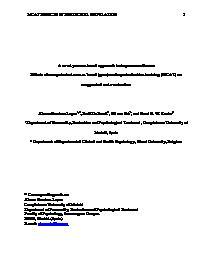A novel process-based approach to improve resilience : Effects of computerized mouse-based (gaze) contingent attention training (MCAT) on reappraisal and rumination
Highlights:
• We tested the role of a novel approach to improve emotion regulation processes.
• A novel mouse-based contingent attention training (MCAT) was used.
• Active MCAT facilitated attention regulation, leading to transfer effects.
• MCAT resulted in improved reappraisal and reduced state rumination.
• MCAT is an important step toward more personalized and advanced interventions.
Geachte bezoeker,
De informatie die u nu opvraagt, kan door psychotraumanet niet aan u worden getoond. Dit kan verschillende redenen hebben,
waarvan (bescherming van het) auteursrecht de meeste voorkomende is. Wanneer het mogelijk is om u door te verwijzen naar de bron
van deze informatie, dan ziet u hier onder een link naar die plek.
Als er geen link staat, kunt u contact opnemen met de bibliotheek,
die u verder op weg kan helpen.
Met vriendelijke groet,
Het psychotraumanet-team.
In: Behaviour Research and Therapy ISSN: 0005-7967 | 118 | july | 110-120
https://www.sciencedirect.com/science/article/abs/pii/S0005796719300695


